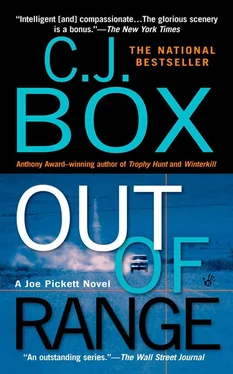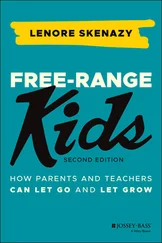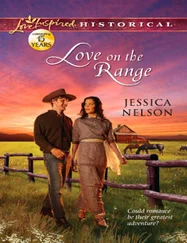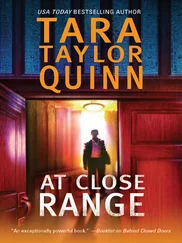C. Box - Out of Range
Здесь есть возможность читать онлайн «C. Box - Out of Range» весь текст электронной книги совершенно бесплатно (целиком полную версию без сокращений). В некоторых случаях можно слушать аудио, скачать через торрент в формате fb2 и присутствует краткое содержание. Жанр: Триллер, на английском языке. Описание произведения, (предисловие) а так же отзывы посетителей доступны на портале библиотеки ЛибКат.
- Название:Out of Range
- Автор:
- Жанр:
- Год:неизвестен
- ISBN:нет данных
- Рейтинг книги:5 / 5. Голосов: 1
-
Избранное:Добавить в избранное
- Отзывы:
-
Ваша оценка:
- 100
- 1
- 2
- 3
- 4
- 5
Out of Range: краткое содержание, описание и аннотация
Предлагаем к чтению аннотацию, описание, краткое содержание или предисловие (зависит от того, что написал сам автор книги «Out of Range»). Если вы не нашли необходимую информацию о книге — напишите в комментариях, мы постараемся отыскать её.
Out of Range — читать онлайн бесплатно полную книгу (весь текст) целиком
Ниже представлен текст книги, разбитый по страницам. Система сохранения места последней прочитанной страницы, позволяет с удобством читать онлайн бесплатно книгу «Out of Range», без необходимости каждый раз заново искать на чём Вы остановились. Поставьте закладку, и сможете в любой момент перейти на страницу, на которой закончили чтение.
Интервал:
Закладка:
What it boiled down to, Joe saw, was just as Ennis had said on the telephone: The final approval of the project from a wildlife management standpoint would depend on the opinion of the local game warden. Will, for whatever reasons, had withheld his final written opinion and impeded the process. Now it was up to Joe.
No wonder Will drank too much, Joe thought, smiling bitterly.
The headquarters for Beargrass Village was a dark, modern, low-slung building built of unpeeled logs and native stone. It was set into the side of a wooded rise so naturally that it would be possible for someone not aware of its existence to drive right past the building, which Joe almost did. Fortunately, he noticed a wink of sunlight off the windshield of a black Lexus SUV in a wood-shrouded parking lot, and turned his pickup toward it. Three other late-model SUVs were in the lot. He knew he had found the right place when he saw Don Ennis emerge through a sliding glass door and wave.
"Welcome to Beargrass," Ennis boomed. Joe waved back.
Carrying the file, Joe entered and heard the door slide shut behind him. Several men sat at an enormous table in the room. A PowerPoint projector was on a stand, fan humming. Easels were positioned in each corner of the room, as well as a huge diorama of the planned development.
"Funny thing is," Joe said, surveying the room and meeting the eyes of the men at the table, "there is no beargrass in Wyoming. There's beargrass in Montana, in the northwest corner. But I guess you like the name."
Ennis blinked uncomfortably, then glared at Joe.
"That's trivial," he said in a way intended to end the discussion.
"Probably is," Joe agreed.
The three men at the table all stood to shake Joe's hand and introduce themselves. Jim Johnson was the contractor, a bearish man with a full beard, a barrel chest, and callused hands. Shane Suhn was younger, stylish and fit, and said he was Don Ennis's chief of staff.
Joe asked, "Chief of staff?"
Suhn's face hardened and paled. "Personal secretary, then," he said.
"Pete Illoway," the third man said in a melodious tone. "Pleased to meet you."
"I've heard of you," Joe said, seeing that his comment made Illoway smile with the glow of recognition. Illoway had sunburned, chiseled movie-star features and longish blond hair that curled over the collar of his Patagonia fishing shirt. He exuded health, contentment, and well-being, Joe thought. Illoway carried himself in a way that suggested he was used to being stared at and admired.
"So you know of the Good Meat Movement," Illoway said. "That's a good start."
"I know a little," Joe said, "not much."
"Have a seat, gentlemen," Ennis said, charging toward the table in the head-down way he charged toward everything. "Let's show Mr. Pickett our plan and have some lunch."
Shane Suhn dimmed the lights and handed the projector remote to Ennis. Ennis waited until Joe was seated, then stood directly behind him, pointed the remote at the projector, and triggered the first image. Ennis stood so close that Joe could smell his cologne and feel his body heat.
The presentation took twenty minutes and was dazzling in its professionalism, Joe thought. The logo for Bear-grass Village, the stylized lettering set against stalks of tawny beargrass, appeared in the lower left corner of every slide and burned into his subconscious.
The concept was for 120 homes, each with ten to twenty private acres. The homes would be situated concentrically throughout the property, built with native materials within a restored landscape, much like the headquarters itself. There would be no telltale signs of construction, reseeding, commercial landscaping; it would look as if the homes emerged from the earth itself with no assistance from human beings. No home could be seen from another home. Beyond the private acres the land was common to all.
"The commons will be just as wild as it is now," Ennis said, forwarding through photos of bears, deer, moose, and grouse, "and available to all. Beargrass residents can hike on it, camp on it, hunt on it if they want to."
That got Joe's attention.
"Don't worry," Ennis said impatiently, as if he had been anticipating Joe's reaction, "everything will be by the book, in accordance with state law. Hunting licenses, all of that crap. But here's the kicker," he said, advancing the presentation quickly through drawings of barns, corrals, and a pasture so green it burned Joe's eyes.
"This is where the stock is born, raised, and eventually slaughtered. Each resident will contract for a number of animals-pigs, chickens, goats, sheep, cattle-to be cared for by the staff. The stock animals will receive the best of care and will be rotated on our pastures. They'll be raised holis-tically, organically, with no growth hormones, chemicals, or processed feed. If the residents want to get involved, they can. I suspect most of them will want to be a part of that."
On cue, Pete Illoway stood up and Ennis handed him the remote in a well-practiced way.
"Time for lunch," Illoway said.
The lights came up and a double door opened behind the screen. Joe could see a white-clad waiter and waitress, both Hispanic, push serving carts through the gloom. A platter filled with sizzling meats and colorful vegetables was placed in front of him.
Joe said, "Wow."
"Make sure to sample everything," Illoway said, sitting down to his own platter and rattling his silverware.
Joe cut off slices of each kind of meat. The beef was tougher than he expected, but it exploded with flavor. The pork burst with sharp juices. The chicken tasted slightly wild, with a tang of pine nuts.
"What do you think?" Illoway asked, knowing the answer.
"Everything is fantastic," Joe said.
"Have you ever had beef or chicken that tasted like that?"
"Beef, yes," Joe said, explaining that his family purchased beef in quarters or halves direct from Bill Stafford's ranch outside Saddlestring when they could afford to do so. "Chicken, no."
Illoway nodded. "Not many people have the experience you have with beef, so they're blown away by this. And very few contemporary Americans know what a chicken can taste like that's been raised naturally, with a free-range lifestyle with no hormones or chemicals introduced."
"Here we go with the lecture," Ennis sighed. Joe smiled at that.
Illoway cut another piece of beef and stabbed it with his fork, then pointed the fork toward Joe. "Modern Americans have almost totally lost touch with the natural world," he said. "They don't know where their food comes from. They think their meat comes from a Styrofoam package wrapped with plastic or from the kitchen of a restaurant. This has been one of the most fundamental and harmful shifts that has ever taken place in our culture. The connection between our food source and ourselves has been lost, and we're not the better for it.
"Think about it, Joe," Illoway continued. "For centuries, human beings have interacted with their source of food. We herded animals, cared for them, bred them to be stronger and better suited for the world. Or we hunted them in their own environment, and therefore had to learn about them and appreciate them. In turn, we learned from our animals that there is a circle of life, interconnectivity with nature and our environment. This was hard-wired into our souls, this synchronicity of coexistence. We depended on our animals to provide us with nourishment and health; they depended on us for shelter and protection.
"Enlightened people are becoming aware of how unethical, how soulless , our farms and ranches have become-if you can even call them farms and ranches." Illoway paused dramatically. "They're really just meat factories, where animals are packed together, force-fed and filled with growth hormones, then killed without ever living a natural life. Chickens have their beaks snipped off so they can't hurt each other. Cattle are crammed into stalls and fattened. Modern hog farms are worse than any concentration camp ever even conceived by man." To illustrate his point, Illoway advanced through a series of grotesque black-and-white photos of hogs festering with sores, beakless chickens, rivers of black blood coursing through troughs at a cattle slaughterhouse. At last, Joe thought, the photos ran out and the screen was filled with pure blue.
Читать дальшеИнтервал:
Закладка:
Похожие книги на «Out of Range»
Представляем Вашему вниманию похожие книги на «Out of Range» списком для выбора. Мы отобрали схожую по названию и смыслу литературу в надежде предоставить читателям больше вариантов отыскать новые, интересные, ещё непрочитанные произведения.
Обсуждение, отзывы о книге «Out of Range» и просто собственные мнения читателей. Оставьте ваши комментарии, напишите, что Вы думаете о произведении, его смысле или главных героях. Укажите что конкретно понравилось, а что нет, и почему Вы так считаете.












